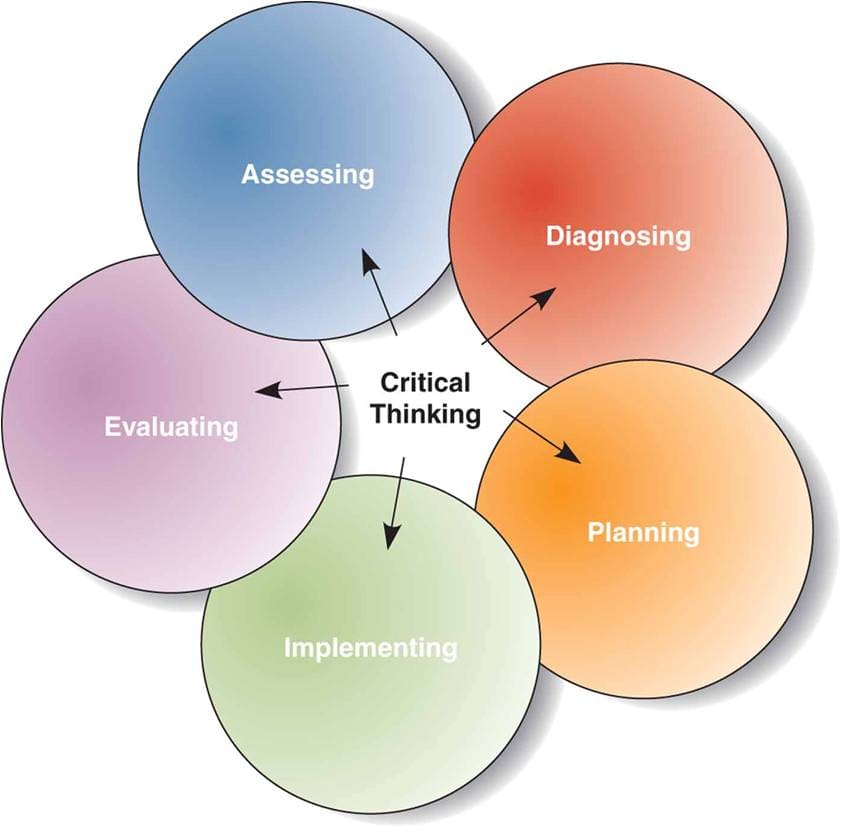Table of Contents
Introduction
When it comes to finding a beneficial healthcare plan to better oneself, many individuals seem to find it challenging. Different forms of media, from television, advertisements, reviews, and commercials, promote the “best choices for your health.” However, it shouldn’t be difficult when many people are referred to the right healthcare professional that understands what is happening to their bodies. Today’s article examines how general pain is managed through chiropractic care and how A.A.P.I.E.R’s clinical process is implemented in a chiropractic office. We refer patients to certified providers specializing in treatments to aid individuals suffering from various chronic issues. We also guide our patients by referring them to our associated medical providers based on their examination when it’s appropriate. We find that education is the solution to asking our providers insightful questions. Dr. Alex Jimenez DC provides this information as an educational service only. Disclaimer
How Pain Is Managed Through Chiropractic Care
Have you been feeling pain in your body, like your neck, back, hips, or shoulders? Do you feel inflammatory effects affecting your joints or muscles? Or what about nerve pain affecting your motor skills to do simple tasks? Many of these symptoms are associated with pain in the musculoskeletal system, and one of the non-invasive treatments that can help is chiropractic care. Studies reveal that pain in the body is one of the most common complaints worldwide, and chiropractic care can help manage the symptoms associated with pain while being cost-efficient. Chiropractic care can help the individual in distress by performing a detailed exam of the affected muscles and joints. Other studies reveal that the chiropractic approach to pain in the musculoskeletal system allows restoration and health protection between the spine and body functionality. In this relationship, chiropractic care may alleviate disorders in the body structure so that a person’s general health can be restored. Chiropractors also can combine different treatment plans catered to each individual’s needs.
What Do We Offer?-Video
Have you been dealing with pain in random areas of your body? Do you wake up feeling stiff when you stretch? Or do issues of inflammation or joint pain seem to affect your daily activities? If you have been experiencing these issues in your body, why not incorporate chiropractic care as part of your health and wellness journey? The video above explains what Dr. Alex Jimenez DC and his team offer in their office: chiropractic care, functional wellness, and nutrition that caters to many individuals. Studies reveal that chiropractic care is utilized clinically to help patients who suffer from musculoskeletal pain (chronic and acute) through spinal manipulation. Chiropractic care can help realign spinal subluxation (misalignment) to repair and heal any dysfunction in the body. Chiropractic care also helps loosen the stiff muscles surrounding the joints, improve the range of motion and even improve chronic disorders associated with environmental issues affecting the body. Chiropractors work with associated providers to develop the best treatment possible for the patient.
The Clinical Process In A Chiropractic Clinic
The clinical process in a chiropractic clinic is when a chiropractor goes through a process known as A.A.P.I.E.R. This acronym is a systemic method used to provide care for the patient. A.A.P.I.E.R stands for:
- Assessment- recognized cues
- Analysis- analyze signals and prioritize hypotheses
- Planning- generate a plan or solution
- Implementation- executing the plan or taking action
- Evaluation- evaluate the outcomes
- Repeat- Repeat the process again
This acronym allows chiropractors and doctors to assess their patients and create a sense of routine that many people can use in everyday life. For example, a person wants to live healthier due to a chronic issue affecting their body. First doctor or chiropractor must assess the situation, then analyze what is going on with the patient, then come up with a plan to alleviate the problem, then execute or implement their strategy for the patient, evaluate their plan, and finally repeat the process.
Assessment/Data Collection
Assessment or data collection helps address the process of gathering subjective and objective data relative to the patient, thus confirming, communicating, and documenting the information being obtained. To that point, assessment/data collecting is related to the cognitive skill doctors use, known as recognizing cues. Doctors can apply this mental skill to acknowledge the data that is being collected from the patient. As the first step of the clinical process, doctors look for an option to address the assessment/data collection. If that option is presented in the patient’s data, then doctors will select the option. However, if the assessment action is not noted as one of the options, then doctors should prioritize the following steps in the clinical problem-solving process as the first action.
Analysis
Now the analysis is the most difficult because doctors are required to understand the principles of physiological responses and interpret the assessment data provided by the patient. When doctors analyze the data, they must think critically and determine the rationale for therapeutic intervention that could potentially be addressed. The analysis uses the cognitive skill of analyzing cues that need doctors to collect data from the patient’s presentation while determining if the data is expected or unexpected. The analysis also uses the cognitive skill prioritizing hypothesis that determines the patient’s needs or problems, thus prioritizing them. To that point, prioritizing the hypothesis requires doctors to analyze and rank the patient’s needs or problems as a priority.
Planning
When planning in the A.A.P.I.E.R. clinical process, the best possible treatment for the patient requires using hypotheses that determine the goals and outcomes of how these goals are designed. It is essential that doctors must address the planning step of the clinical process by keeping two crucial points in mind. First is to remember that this is an examination for the patient and to answer the patient’s questions most likely related to the clinical plan unless it anticipates the providers that will be prescribed to the patient. The second point is to remember that the questions are connected to the patient’s list of problems or issues, thus generating solutions and care plans.
Implementation
Implementation in the A.A.P.I.E.R. acronym addresses the process of organizing and managing care for the patient. Implementation incorporates counseling, teaching, providing care to achieve established goals, and other interventions that doctors use for optimal care for the patient. The implementation uses the cognitive skill, taking action that allows the doctor to implement and generate solutions that address the highest priorities for the patient. To that point, doctors need to be concerned about the patient in question that the patient is their only assigned patient while answering all the patient’s questions as if there is available time to care for the patient, thus providing the needed resources for them.
Evaluation
The evaluation compares the actual and expected outcomes of the patient’s care. Evaluation allows the doctor or chiropractor to monitor or make a judgment call on the patient’s response to the therapy. Evaluation utilizes the cognitive skill to evaluate the patient’s outcome by addressing the patient’s ability to self-care, the health care provider’s ability to implement care and the communication process, and documenting evaluation findings, including the negative results.
Repeat
The final step for A.A.P.I.E.R. is repeating the steps by returning to the first step, assessment. Repeating steps every time a chiropractor or doctor sees their patients can provide a better understanding of their ailments and needs and come up with solutions that cater to the patient. These steps over time can be implemented for many individuals through practice and can provide better solutions for everyday life and wellness.
Conclusion
Incorporating A.A.P.I.E.R. clinical process in any treatment can allow doctors to think of a solution for their patients. Many professional healthcare providers can implicate this process in their practice. They can help their patients utilize this systemic thinking process in their daily lives for a healthier lifestyle. When it comes to this protocol, many chiropractors or doctors can come up with the best-advanced treatments to offer to individuals dealing with chronic issues associated with pain in the musculoskeletal system using this acronym.
References
Blanchette, Marc-André, et al. “Effectiveness and Economic Evaluation of Chiropractic Care for the Treatment of Low Back Pain: A Systematic Review of Pragmatic Studies.” PloS One, Public Library of Science, 3 Aug. 2016, https://www.ncbi.nlm.nih.gov/pmc/articles/PMC4972425/.
Navid, Muhammad Samran, et al. “The Effects of Chiropractic Spinal Manipulation on Central Processing of Tonic Pain – a Pilot Study Using Standardized Low-Resolution Brain Electromagnetic Tomography (Sloreta).” Scientific Reports, Nature Publishing Group UK, 6 May 2019, https://www.ncbi.nlm.nih.gov/pmc/articles/PMC6502880/.
Salehi, Alireza, et al. “Chiropractic: Is It Efficient in Treatment of Diseases? Review of Systematic Reviews.” International Journal of Community Based Nursing and Midwifery, Shiraz University of Medical Sciences, Oct. 2015, https://www.ncbi.nlm.nih.gov/pmc/articles/PMC4591574/.
Disclaimer
Post Disclaimer
Professional Scope of Practice *
The information herein on "An In-Depth Look Of The Clinical Process Of A Chiropractic Clinic" is not intended to replace a one-on-one relationship with a qualified health care professional or licensed physician and is not medical advice. We encourage you to make healthcare decisions based on your research and partnership with a qualified healthcare professional.
Blog Information & Scope Discussions
Welcome to El Paso's Premier Wellness, Personal Injury Care Clinic & Wellness Blog, where Dr. Alex Jimenez, DC, FNP-C, a Multi-State board-certified Family Practice Nurse Practitioner (FNP-BC) and Chiropractor (DC), presents insights on how our multidisciplinary team is dedicated to holistic healing and personalized care. Our practice aligns with evidence-based treatment protocols inspired by integrative medicine principles, similar to those found on this site and our family practice-based chiromed.com site, focusing on restoring health naturally for patients of all ages.
Our areas of multidisciplinary practice include Wellness & Nutrition, Chronic Pain, Personal Injury, Auto Accident Care, Work Injuries, Back Injury, Low Back Pain, Neck Pain, Migraine Headaches, Sports Injuries, Severe Sciatica, Scoliosis, Complex Herniated Discs, Fibromyalgia, Chronic Pain, Complex Injuries, Stress Management, Functional Medicine Treatments, and in-scope care protocols.
Our information scope is multidisciplinary, focusing on musculoskeletal and physical medicine, wellness, contributing etiological viscerosomatic disturbances within clinical presentations, associated somato-visceral reflex clinical dynamics, subluxation complexes, sensitive health issues, and functional medicine articles, topics, and discussions.
We provide and present clinical collaboration with specialists from various disciplines. Each specialist is governed by their professional scope of practice and their jurisdiction of licensure. We use functional health & wellness protocols to treat and support care for musculoskeletal injuries or disorders.
Our videos, posts, topics, and insights address clinical matters and issues that are directly or indirectly related to our clinical scope of practice.
Our office has made a reasonable effort to provide supportive citations and has identified relevant research studies that support our posts. We provide copies of supporting research studies upon request to regulatory boards and the public.
We understand that we cover matters that require an additional explanation of how they may assist in a particular care plan or treatment protocol; therefore, to discuss the subject matter above further, please feel free to ask Dr. Alex Jimenez, DC, APRN, FNP-BC, or contact us at 915-850-0900.
We are here to help you and your family.
Blessings
Dr. Alex Jimenez DC, MSACP, APRN, FNP-BC*, CCST, IFMCP, CFMP, ATN
email: [email protected]
Multidisciplinary Licensing & Board Certifications:
Licensed as a Doctor of Chiropractic (DC) in Texas & New Mexico*
Texas DC License #: TX5807, Verified: TX5807
New Mexico DC License #: NM-DC2182, Verified: NM-DC2182
Multi-State Advanced Practice Registered Nurse (APRN*) in Texas & Multi-States
Multistate Compact APRN License by Endorsement (42 States)
Texas APRN License #: 1191402, Verified: 1191402 *
Florida APRN License #: 11043890, Verified: APRN11043890 *
License Verification Link: Nursys License Verifier
* Prescriptive Authority Authorized
ANCC FNP-BC: Board Certified Nurse Practitioner*
Compact Status: Multi-State License: Authorized to Practice in 40 States*
Graduate with Honors: ICHS: MSN-FNP (Family Nurse Practitioner Program)
Degree Granted. Master's in Family Practice MSN Diploma (Cum Laude)
Dr. Alex Jimenez, DC, APRN, FNP-BC*, CFMP, IFMCP, ATN, CCST
My Digital Business Card
RN: Registered Nurse
APRNP: Advanced Practice Registered Nurse
FNP: Family Practice Specialization
DC: Doctor of Chiropractic
CFMP: Certified Functional Medicine Provider
MSN-FNP: Master of Science in Family Practice Medicine
MSACP: Master of Science in Advanced Clinical Practice
IFMCP: Institute of Functional Medicine
CCST: Certified Chiropractic Spinal Trauma
ATN: Advanced Translational Neutrogenomics







 Again, We Welcome You.
Again, We Welcome You.
Comments are closed.